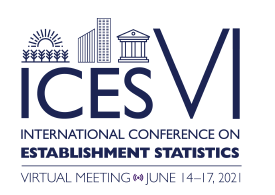All Times ET
Program is Subject to Change
TBD
Controlling Representative Outlier Bias of M-Quantile Model-Based Small Area Estimators (308008)
*Gaia Bertarelli, Department of Economics and Management, University of Pisa, ItalyRay Chambers, National Institute for Applied Statistics Research Australia University of Wollongong, Australia
Nicola Salvati, Department of Economics and Management, University of Pisa, Italy
Francesco Schirripa Spagnolo, Department of Economics and Management, University of Pisa, Italy
Keywords: M-quantile , small area estimation, bias correction, conditional bias
Representative outliers occur frequently in surveys. Several methods have been proposed to mitigate their impact on survey estimates. If outliers are a concern for estimation of population quantities, it is even more necessary to pay attention to them in a small area estimation (SAE) context. Chambers and Tzavidis (2006) addressed this issue of outlier robustness in SAE, using an approach based on fitting outlier robust M-quantile models to the survey data. Sinha and Rao (2009) addressed this issue from the perspective of linear mixed models. Both these approaches use plug-in robust prediction, i.e. they replace parameter estimates in optimal, but outlier-sensitive, predictors by outlier robust versions. These predictors are efficient under correct model specification and assumptions, but they may be sensitive to the presence of outliers because they use plug-in robust prediction which leads to a low prediction variance and a considerable prediction bias. Dongmo Jiongo et al. (2013) and Chambers et al. (2014) have proposed bias correction methods to reduce the prediction bias when the response variable is continuous. We focus on the M-quantile approach and we propose two general methods (i.e., for continuous and discrete data) to reduce the prediction bias of robust M-quantile predictors in the SAE context. The first estimator is based on the concept of conditional bias and extends the results of Beaumont et al. (2013) and Favre-Martinoz (2015). We also propose an unified approach to M-quantile predictors which is based on a full bias correction and can be viewed as a generalization of the approach of Chambers (1986). A Monte-Carlo simulation study is conducted. Its results suggest that our approaches generally improve the efficiency and control the prediction bias of M-quantile predictors when the population contains units that may be influential if selected in the sample. Results based on the Italian sweep of the Eu-SILC 2017 survey are also presented.
